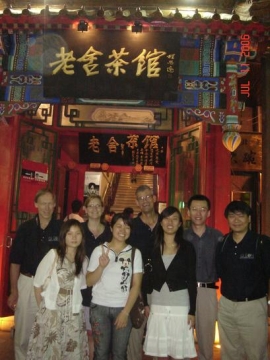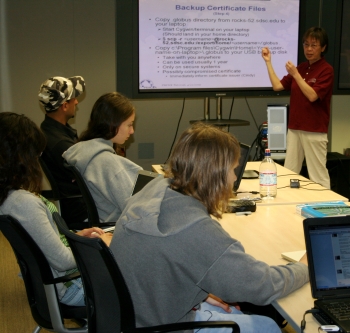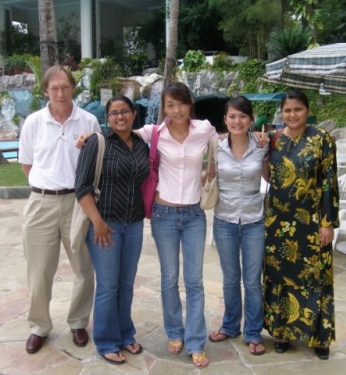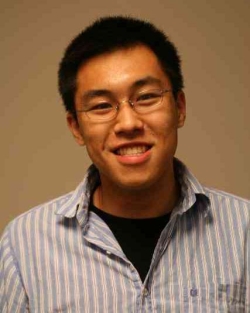BIG DATA
UC San Diego Expands Summer Program for Undergraduate Cyberinfrastructure Research in Asia and Pacific Rim
|
For the second year in a row, the Pacific Rim Experiences for Undergraduates (PRIME) research abroad program at UC San Diego has expanded to include many more students, as well as more host countries and institutions. This summer, 33 undergraduates will have the unique experience of being full-time researchers in 13 labs at host institutions across Asia and the Pacific Rim.
PRIME provides undergraduates with the opportunity to spend their summer immersed in both scientific research and a new culture. Working with mentors at both the host institution and at UC San Diego, they do real research while living for nine weeks in countries located mostly around the Pacific Rim. This gives them experience with the increasingly collaborative and international scientific workplace of today.
At 33, the 2009 group is by far the largest that PRIME has ever had, having doubled each of the last two years. This brings the total number of students to over 100 since 2004. In its sixth year, PRIME has matured into a significant summer research opportunity for undergraduates at UC San Diego, becoming better known each year.
In fact, one of this year's applicants told the selection committee that she heard about the program at Admit Day and she accepted the UC San Diego offer, to a large degree, because of PRIME. The record numbers are due in part to previous students helping advertise the program.
|
"There has been amazing growth in the program this year, particularly in terms of student numbers. Our applicant pool nearly doubled in size," said Peter Arzberger, cofounder of PRIME. "The quality was so high and we wanted to accommodate as many as we could. We believe that an opportunity to live and work in an international site is important for our national and global society."
"We are not alone in our belief in the importance of providing students with experiential training in both the conduct of research and in the international global workplace," noted Gabriele Wienhausen, PRIME's principal investigator (PI) and cofounder. "University presidents, congressional panels and task forces as well as foundations, such as NSF, have highlighted this need. In addition, the current student generation understands the need and value of an international educational experience."
"Science and engineering students have a packed curriculum. If they wish to graduate in four years they often cannot do a semester or year abroad," explained Wienhausen. "Using the summer for a significant educational experience allows the students to fulfill one of their educational goals." Wienhausen is the associate dean of education for the UC San Diego division of Biological Sciences.
PRIME leverages the scientific community and cyberinfrastructure built by the Pacific Rim Application and Grid Middleware Assembly (PRAGMA) project. PRAGMA is a group of leading Pacific Rim research organizations collaborating on advancing grid technology applications. Arzberger is the chair of PRAGMA's Steering Committee. The majority of the PRIME host institutions are members of PRAGMA.
|
The new host sites for 2009 are Doshisha University (Kyoto, Japan), National Museum of Marine Biology and Aquarium (Kenting, Taiwan), National Taiwan University (Taipei, Taiwan) and the University of Hyderabad (India). Three institutions joined last year: University of Auckland and the University of Waikato (both in New Zealand) and the Universiti Sains Malaysia (Penang, Malaysia).
Monash University (Melbourne, Australia), the Computer Network Information Center, Chinese Academy of Sciences (Beijing, China), the Cybermedia Center, Osaka University (Osaka, Japan) and the National Center for High-performance Computing (Hsinchu, Taiwan) are original host institutions. The National Institute for Information and Communications Technology (Kyoto, Japan) and the National Center for Research on Earthquake Engineering (Taipei, Taiwan) are also continuing hosts.
This spring, prior to their summer research adventures, students are spending time in the labs of their UCSD mentors. In addition, many will work on projects which use or extend the cyberinfrastructure built by PRAGMA, the PRAGMA Grid. To help the students be ready for working on the Grid, Cindy Zheng, the PRAGMA Grid coordinator, is giving tutorials this spring.
Students will work on a wide variety of projects which will contribute to ongoing research in their host's lab and/or their UCSD mentor's lab; more information will be available later on the specific projects.
Past participants have found the scientific and cultural experience of PRIME very rewarding, and for many, the program has had a powerful, lifelong impact on their careers and lives.
|
"My summer through PRIME in Australia sparked a fire in me to pursue my graduate studies in a whole new way," an ecstatic David Allen Wong (PRIME 2008) recently wrote to his mentors and the PRIME organizers sharing the news of his acceptance into the Singapore-MIT Alliance graduate program. It is an 18-month dual masters program through the Massachusetts Institute of Technology (MIT) and the National University of Singapore and the Nanyang Technological University in Singapore.
"I fly out one week after graduation and spend a summer in Singapore. I come back for a semester at MIT, and then spend a whole year in Singapore where I'll be remoting in to MIT classes, working at a Singapore company, and writing my two theses," continued Wong. "Being in PRIME was what gave me the motivation and courage to attempt such a feat. Being a part of PRIME last summer was one of the best decisions I have made in my life. I am so excited to have such a unique graduate school experience waiting for me. Thank you so much." Wong is a UC San Diego chemical engineering major and he worked with David Abramson's group at Monash University.
More success stories: Last fall four PRIME alums were asked to reflect on their experiences in the program and how it helped to shape who and where they are today (link to story below).
In addition to the new sites and their contributions of resources (personnel and funds), this record growth was also made possible by adding eight new mentors at UC San Diego and an increased number of sources and contributions of funding.
PRIME is funded by the National Science Foundation (NSF) (including supplemental support from NSF's program for India), with additional support from the UC San Diego division of the California Institute for Telecommunications and Information Technology (Calit2), the National Biomedical Computation Resource (NBCR), the Gordon and Betty Moore Foundation, the bioengineering department of UCSD's Jacobs School of Engineering, additional partners and the host institutions, including additional support at USM, NiCT and Doshisha University.
The PRIME 2009 participants:
|
Related Links
PRIME program website
PRIME - institutions and scientists
PRAGMA Grid Operations Center
Related Articles:
Early Alums of Pacific Rim Cyberinfrastructure Undergraduate Program Reflect Back To Find the Future




